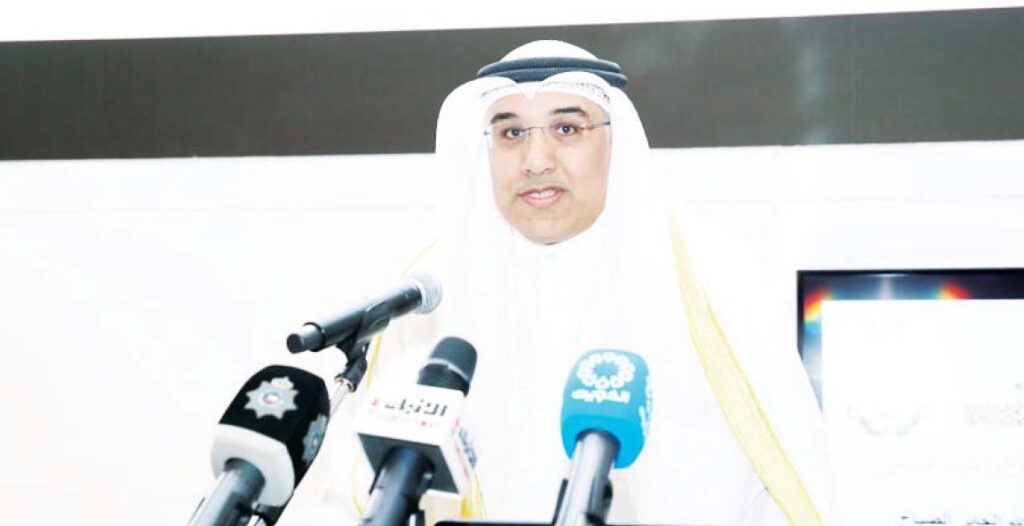06/11/2023
06/11/2023
KUWAIT CITY, Nov 6: Under the patronage of the Minister of Foreign Affairs Sheikh Salem Abdullah Al-Jaber, the “International Day for the Prevention of the Use of the Environment in Wars and Military Conflicts” was celebrated yesterday, which falls on November 6th of every year. It coincides with the anniversary of the extinguishing of the last Kuwaiti oil well that was ignited by Iraqi aggressors prior to their defeat in the war in Kuwait in 1991.

The celebration is organized annually by the Kuwait Society for Environmental Protection with the cooperation of the Kuwait Oil Company. Representing Minister Al-Jaber in the celebration, which was held at the Jaber Al-Ahmad Oil and Gas Exhibition in Ahmadi City, was the Assistant Minister of Foreign Affairs for International Organization Affairs Abdulaziz Al-Jarallah. In his speech, Al-Jarallah thanked the Kuwait Society for Environmental Protection and Kuwait Oil Company for holding the celebration, which reveals “their awareness of their societal responsibility to consolidate the importance of protecting the environment at the national level.”
He emphasized “the support of the State of Kuwait to address environmental challenges and its essential role in fulfilling its responsibilities towards preserving the environment at the national and international levels according to the available capabilities.” Al-Jarallah said, “We remember with great pride the pivotal role played by the State of Kuwait in submitting General Assembly resolution No. 4/56 in 2001. Kuwait had previously suffered from the use of the environment as a tool of war, after the burning of oil wells by the forces of the former Iraqi regime prior to their withdrawal from Kuwaiti territory in 1991, which caused one of the worst human-made environmental disasters in the 20th century.”
The representative of the sponsor of the celebration denounced “the gross infringements and violations we are witnessing in the Gaza Strip by Israel, the occupying authority, especially those that constitute a violation of international resolutions and international humanitarian law, such as targeting thousands of defenseless civilians, including children and women, depleting Palestinian natural resources, and destroying the environment and all aspects of life, which exposes the sector to a grave humanitarian and environmental catastrophe.”
Al-Jarallah stressed, “the State of Kuwait’s belief that protecting the environment is everyone’s responsibility in times of conflict and war as well as in times of peace”. He called on the international community to “find deterrent solutions to ensure environmental protection in armed conflicts.” Al-Jarallah stressed the importance of “seriously considering the strengthening of international efforts to activate the principle of responsibility and accountability for crimes committed against the environment as a result of wars and conflicts.”
Participation
He expressed hope that effective participation in the Conference of the Parties on Climate Change COP28, scheduled to be held in Dubai at the end of this month, will contribute to strengthening international cooperation on the issue of environment and climate. Furthermore, the Chairperson of the Board of Directors of the Kuwait Society for Environmental Protection Dr. Wijdan Al-Oqab, delivered a speech, which she began by affirming solidarity with Gaza and the Palestinian people, and supporting their right to “live in dignity and freedom in their independent state.”
She also thanked the Minister of Foreign Affairs for his sponsorship of the celebration, and the ministry for its belief in the association’s initiative about 23 years ago when His Highness the late Amir Sheikh Sabah Al-Ahmad adopted it while he was Minister of Foreign Affairs. It led to the United Nations issuing a resolution declaring the anniversary of the extinguishing of the last Kuwaiti oil as well as “the International Day for Preventing the Use of the Environment in Wars and Military Conflicts,” which falls on November 6 every year. Dr. Al-Oqab also thanked the Kuwait Oil Company, which is the association’s strategic partner for its keenness to annually participate effectively in the responsibility of organization and reception. She stressed that the International Day for Preventing the Use of the Environment in Wars and Military Conflicts this year chose the theme “Mines and their Environmental Repercussions.” Dr. Al-Oqab said, “This dimension is consistent with the course of events currently taking place in our Arab region, in light of what the occupied Palestinian territories are exposed to, especially the Gaza Strip, which is facing the horrors of genocide, oppression, displacement, and other crimes. From an environmental perspective, what is happening is considered ecocide, and a disaster that tops the list of threats to human life, wildlife, and biodiversity, now and in the long term.”
She called on international courts to “charge Israel with ecocide.” In the context of her talk about the environmental damage resulting from mine clearance, and its variation from one country to another, Dr. Al-Oqab touched on the topic of the mines planted by the Iraqi aggression in Kuwait in 1990, and Kuwait’s wild environment, “which helped exacerbate the problem with the disappearance of large numbers of munitions and mines under the moving sand dunes and in the hollows of wet areas.” She revealed that the work teams responsible for clearing the country of mines faced many technical and logistical difficulties and problems while carrying out their tasks. Dr. Al-Oqab explained that experts’ estimates indicate that the total number of mines removed from Kuwaiti territory is approximately one million and 650 thousand mines. Among them are more than a million anti-personnel mines. History records that the highest number of mines planted per square kilometer was monitored in Kuwait, reaching 92 mines/square kilometers.
By Suzanne Nasser
Al-Seyassah/Arab Times Staff


